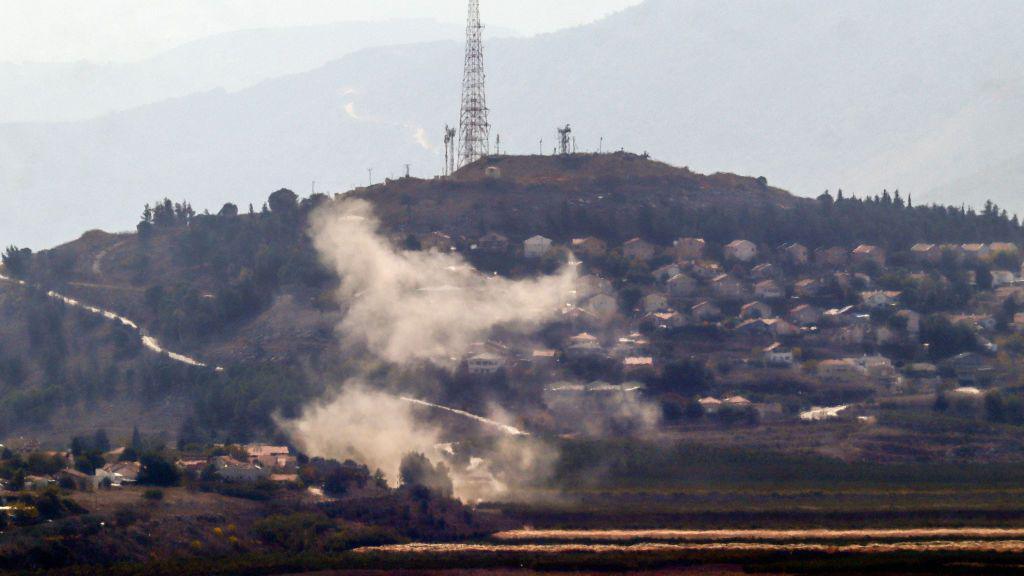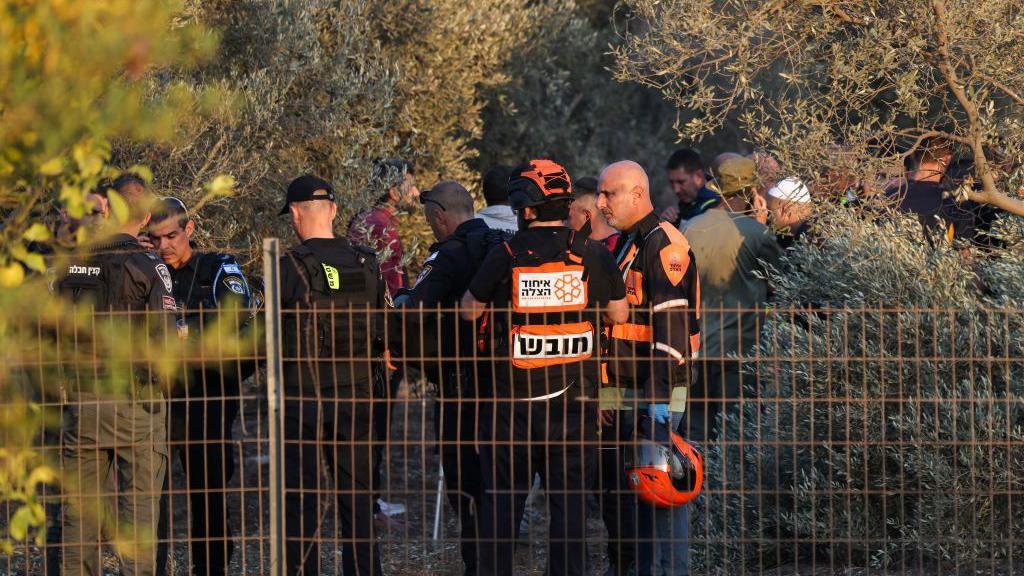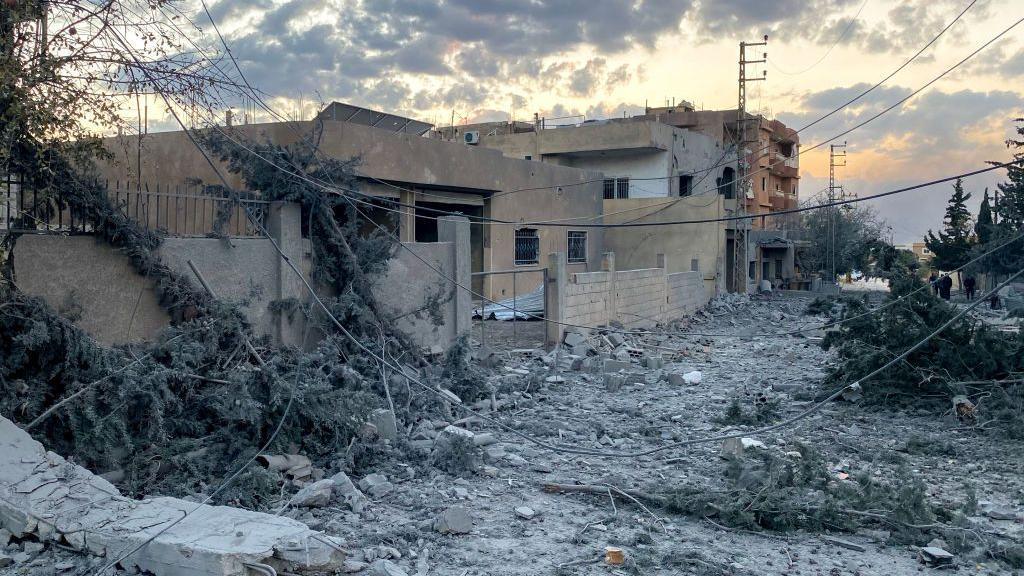Seven killed in Israel in deadliest Hezbollah rocket strikes in months

Smoke was seen rising from the Israeli town of Metula following a Hezbollah rocket attack on Thursday
- Published
Two separate Hezbollah rocket attacks have killed seven people in northern Israel, authorities say, in the deadliest day of such strikes in months.
An Israeli farmer and four Thai agricultural workers were killed when rockets landed near Metula, a town on the border with Lebanon, Israeli and Thai officials said.
Later, an Israeli woman and her adult son were killed in an olive grove near Kibbutz Afek, on the outskirts of the coastal city of Haifa.
Hezbollah said it had fired barrages of rockets towards the Krayot area north of Haifa and at Israeli forces south of the Lebanese town of Khiam, which is across the border from Metula.
The Israeli military identified two projectiles crossing from Lebanon and falling in an open area near Metula on Thursday morning.
The Israeli farmer who was killed was named by local media as Omer Weinstein, a 46-year-old father-of-four from nearby Kibbutz Dafna.
Thailand's Foreign Minister, Maris Sangiampongsa, said on Friday that four Thai nationals were killed by rocket fire.
A fifth Thai worker was injured, he added.
Videos posted online showed them being transferred by helicopter to the Rambam Health Care Campus in Haifa.
The Israeli newspaper Haaretz said Mr Weinstein and the foreign workers were in an agricultural field near the border fence at the time of the attack.
It cited a member of the local emergency response team as saying the Israeli military had permitted them to enter the area despite Metula being inside a closed military zone.
The military established the zone at the end of September, just before it launched a ground invasion of Lebanon with the aim of destroying Hezbollah weapons and infrastructure.

A 60-year-old woman and her 30-year-old son were killed while picking olives near Kibbutz Afek
Thursday’s second rocket attack reportedly hit an agricultural area near Kibbutz Afek, which is about 65km (40 miles) south-west of Metula and 28km from the Lebanese border.
The military said a total of 55 projectiles were fired towards the Western Galilee region, where the kibbutz is located, as well as the Central Galilee and Upper Galilee in the early afternoon. Some of the projectiles were intercepted and others fell in open areas, it added.
According to Haaretz, 60-year-old Mina Hasson and her 30-year-old son, Karmi, were killed by a rocket that hit an olive grove where they were picking olives.
A 70-year-old man was also lightly injured by shrapnel and taken to Rambam hospital, according to the Magen David Adom ambulance service.
"We were called to the olive grove and saw a man in his 30s lying on the ground, unconscious,” MDA paramedics Mazor and Yishai Levy told the Jerusalem Post, external.
“We began resuscitation efforts while conducting further searches, during which we located another casualty, also in critical condition with multi-system injuries. We provided her with medical treatment and performed resuscitation, but unfortunately, we had to pronounce both of them dead," they said.
Meanwhile, the head of the Irish military said a UN peacekeeping base in southern Lebanon that houses Irish troops was hit by a rocket fired towards Israel on Wednesday night.
The rocket landed inside an unoccupied area of Camp Shamrock, which is 7km (4 miles) from the Israeli border, causing minimal damage on the ground and no casualties, Lt Gen Sean Clancy said.
Irish premier Simon Harris said: "Thankfully everyone is safe but it is completely unacceptable that this happened. Peacekeepers are protected under international law and the onus is on all sides to ensure that protection.”
The deadly rocket attacks in northern Israel came as two US special envoys met Prime Minister Benjamin Netanyahu in Jerusalem to discuss a possible ceasefire deal to end the war with Hezbollah.
Netanyahu told Amos Hochstein and Brett McGurk that the main issue was what he called Israel's ability to “thwart any threat to its security from Lebanon in a way that will return our residents safely to their homes”, his office said in a statement.
Israel went on the offensive against Hezbollah - which it proscribes as a terrorist organisation - after almost a year of cross-border fighting sparked by the war in Gaza.
It said it wanted to ensure the safe return of tens of thousands of residents of northern Israeli border areas displaced by rocket attacks, which Hezbollah launched in support of Palestinians the day after its ally Hamas’s deadly attack on Israel on 7 October 2023.
More than 2,800 people have been killed in Lebanon since then, including 2,200 in the past five weeks, and 1.2 million others displaced, according to Lebanese authorities.
Israeli authorities say more than 60 people have been killed by Hezbollah rocket, drone, and missile attacks in northern Israel and the occupied Golan Heights.

A woman was reportedly killed in an Israeli strike in the Kayyal area of Baalbek
Earlier on Thursday, the Israeli military said troops were continuing operations inside southern Lebanon and that aircraft had struck dozens of Hezbollah targets throughout the country.
Lebanon’s health ministry meanwhile said Israeli strikes had killed six paramedics in three southern towns.
Four from the Hezbollah-affiliated Islamic Health Society’s Civil Defence branch, which provides emergency services, were killed when Israeli forces targeted a gathering point at Derdghaya junction, it said.
A fifth IHS paramedic was killed in an air strike on a vehicle in Deir al-Zahrani, while a strike in Zefta killed a paramedic from the Islamic Risala Scout Association, which is affiliated to the Hezbollah-allied Amal movement, according to the ministry.
There was no immediate comment from the Israeli military. But dozens of paramedics and other emergency workers have been killed and injured since it intensified its air campaign against Hezbollah five weeks ago.
The military has previously accused Hezbollah of using ambulances to transport weapons and fighters. The IHS has denied having ties to military operations.
There were also fresh Israeli strikes near Baalbek, in the eastern Bekaa Valley, a day after the Israeli military ordered the evacuation of the entire city and two neighbouring towns.
Lebanon’s state-run National News Agency (NNA) reported that a woman was killed in a strike in the Kayyal area, external.
Another six people were killed when a house was bombed in Maqna, which is 5km north-east of Baalbek but was not included in the evacuation zone, it said.